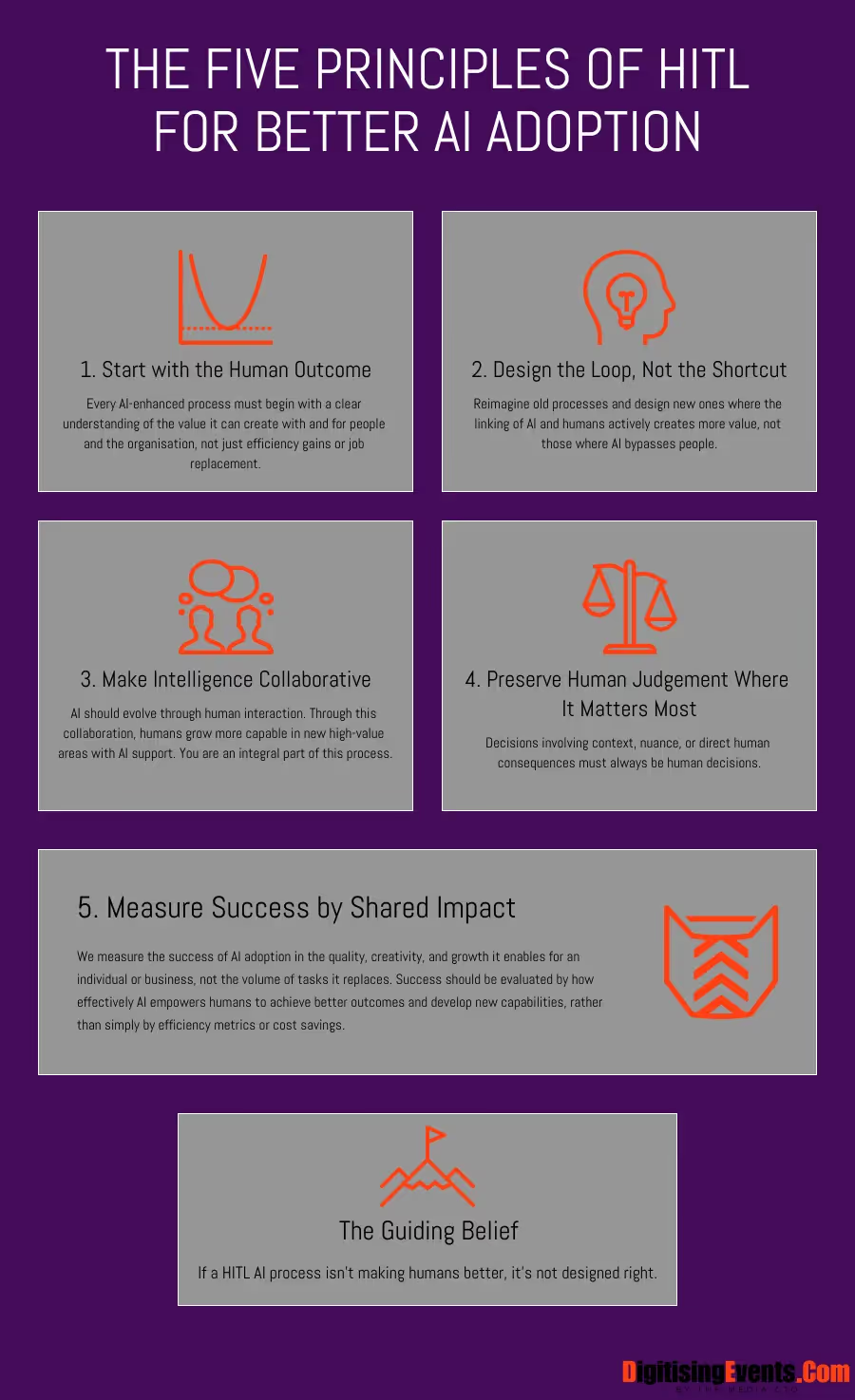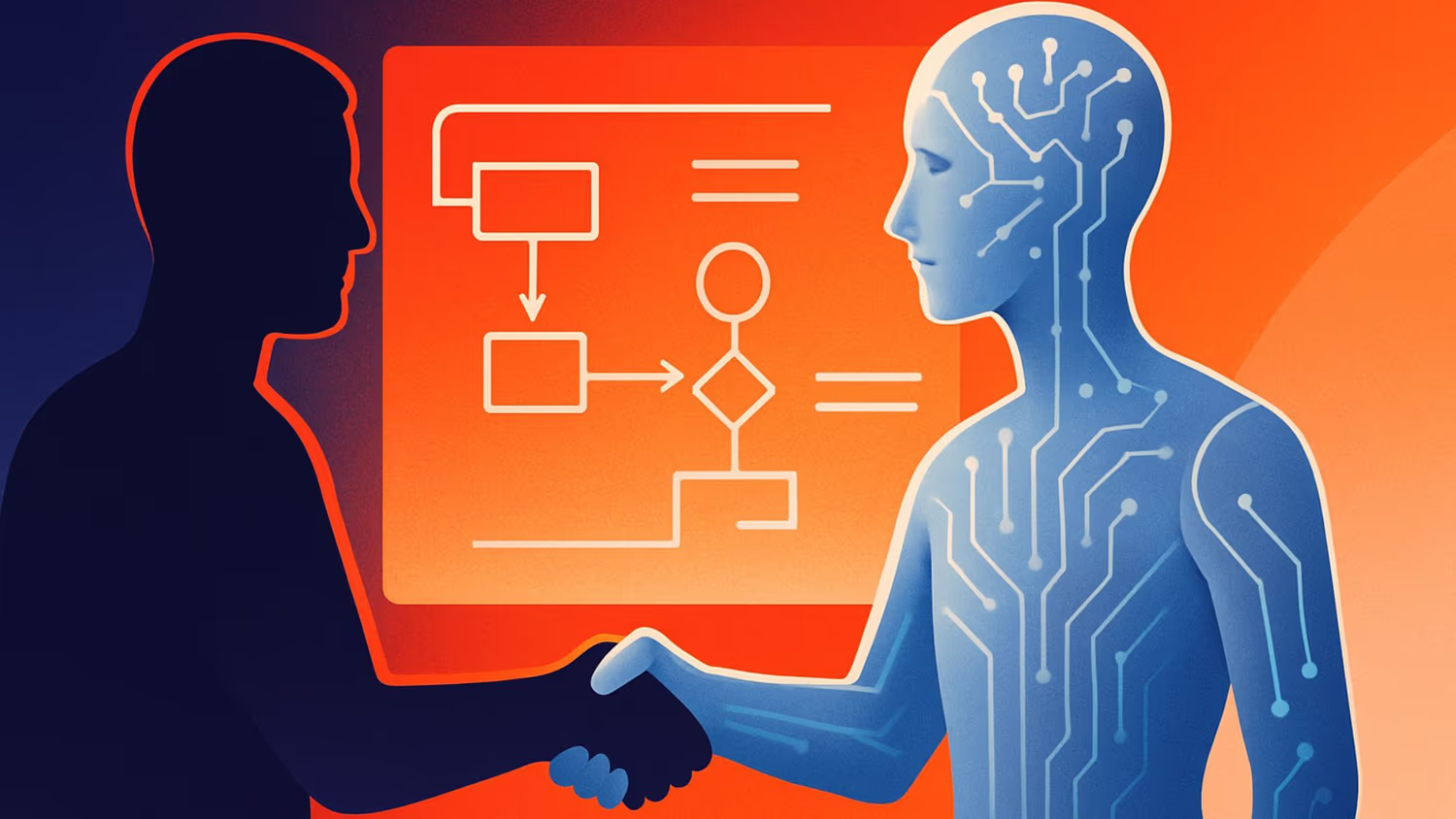While there’s a lot of angst about AI replacing jobs, and therefore replacing humans, I believe we’re asking the wrong question.
Rather than asking how we replace humans to maximise efficiency, we should ask: Where is the best place for humans in this system?
Let's be frank. AI will take on specific jobs simply because it can execute them with a speed and efficiency that we cannot match.
I've already and willingly handed over several of my tasks and discontinued seven SaaS subscriptions (because agents are just as good, and I pay them when they work), and, believe me, I’m lining up more. Why? Because I want my time back, time to focus on what I’m genuinely good at, to amplify my creative and innovative potential.
One of the fundamental shifts in my thinking happened when I stopped viewing Generative AI as just another tool in the shed. Instead, I started cultivating a philosophy of 'buddying up' with AI. Think of it as human-in-the-loop AI process engineering. This isn't about delegating to a machine; it's about collaborating with a new kind of intelligence.
This penny-drop moment wasn’t entirely out of the blue. I cast my mind back to when CRM systems became a big deal, especially when they went fully cloud-based. The salespeople who truly thrived? They were the ones who dived in headfirst and just ‘worked with it’.
The same holds true for organisations. The winners didn’t just implement the tech but worked with it to fundamentally re-engineer the way they sold, served, and scaled. You can have two companies with the same SaaS product, the same industry, and even the same niche. One will invariably sweat that system harder, innovating its customer acquisition process, for instance. I think it was Seth Godin who said something along the lines of:
"Don't just pave the goat path." Seth Godin (roughly paraphrased)
Why AI Feels so very different
Unlike my CRM analogy, which was essentially a shift to cloud computing. Taking computer programs which were coupled to local machines and moving them into the cloud. It was essentially at the tooling shift. A bit like going from a rock to a metal hammer. It felt familiar because it was essentially an evolutionary shift.
In fact, I’d argue that even the advent of the Internet – or the World Wide Web, for the purists – was, in many ways, an evolutionary progression.
This current wave, spearheaded by GPTs and LLMs, is something else. This is a paradigm shift in the truest sense of the word – not the over-milked B2B buzzword, but a genuine seismic upheaval. It’s not just moving the goalposts; it’s replacing them with something entirely new, something instantly, recognisably better. You look at it and just think, "Right, that’s the future, then."
However, while GenAI is the most frequently deployed tech in organisations these days, there are also reports of high failure, with only 48% of AI projects making it past proof of concept. This, I believe, has a lot to do with us anthropomorphising this technology, which makes us try to put it in places it should not be.
Many organisations will miss the boat as a result and stop at the low-hanging fruit of turning on AI and saving the average worker 1 to 2 hours in productivity, and this is fine.
However, if we want to maximise AI's potential and unleash human ingenuity in an unprecedented new way, we must design AI with a human-in-the-loop philosophy.
A Moment Of Conviction
I became utterly convinced of this about 20 months ago (we're in June 2025 as I write this). I made the call and paused my consulting clients. I doubled down, determined to get to grips with this technology, stay relevant, and, frankly, have some fun figuring out how a business like ours could continue to deliver genuine value.
It sparked the same thrill I had when my school got its first BBC Micro. I’d buy those magazines with programme printouts – Frogger, I’m fairly sure it was – and spend hours typing it in, then more hours debugging the inevitable misprints. The sheer elation when it finally worked!
Thankfully, floppy disks became affordable, and that particular brand of masochism became a fleeting memory. But I knew, even then, I’d touched something significant.
That same gut feeling hit me again in late 2023 with ChatGPT. So, here’s where I’ve landed. The following are beliefs I currently hold to be true. I won’t spend an age explaining the journey to each one; I share them because they’re the bedrock of how I’m engaging with this technological tsunami, attempting to ride this colossal, fast-moving wave with some hope of remaining helpful and relevant.
14 Working Beliefs Around AI - Current Thinking
- SaaS as we know it? It’s done. The whole model is ripe for a rethink because it's just CRUD.
- AI will be better at many Jobs than humans. I use "Jobs" intentionally; Work is a different kettle of fish.
- Governments? They’re largely in the dark. They have little idea what’s truly unfolding or how to prepare. And if we're honest, neither do most of us.
- This tech is a massive ‘leveller’. Pardon the pun, but it is. Fundamentally, we’re all pretty much crowded around home base, or maybe first base, in terms of its practical application.
- Not ‘working with’ AI? That’s not a valid opinion anymore. It’s a necessity, but working with is not asking ChatGPT to write your emails.
- LLMs and GPTs, in their current iteration, are largely ‘done’—done in the sense that the major leap has happened. Companies like Google, Anthropic, and OpenAI will keep refining them, but the gains will be incremental from here. I see these base models being leveraged and tuned to specific use cases, e.g., an LLM that knows the entire canon of English Law.
- Agentic AI is where the serious gains are now. And it’s far less complicated to get started with than many believe.
- Business models disconnected from people will shake the hardest.
- SEO, as we’ve known it for the past decade, is a monumental waste of time. That’s why I’m not fussed about cramming this post with Google-friendly keywords. There’s simply no point anymore.
- Solopreneurs and small businesses have a golden window right now. A moment in time to disrupt, gain ground, and make their mark.
- Integrating AI isn’t a job for the tech department alone. It’s an all-hands-on-deck mission, demanding creativity and imagination from everyone to unearth competitive advantages and genuine differentiators.
- The human-in-the-loop approach to AI integration is the only way forward that is socially responsible.
- The value of authenticity is about to go through the roof. It will be the North Star, the necessary counterbalance to the sheer volume and velocity of content AI will unleash.
- NPUs (Neural Processing Units) will be standard in all hardware sooner than we think, and they will be a key AI accelerator.

So, What's the AI Play, Then?
If even half of those points resonate with you, then you’ve got some thinking to do. You need to figure out your answer to that question, because the truth is, nobody has all the answers right now. What is undeniable is the real, significant potential sitting there.
Another certainty I’m holding onto is that we humans are still leagues ahead in imagination and creativity, generally speaking, and particularly within our specialist domains. Aligning with this belief has, for me at least, cut through some of the paralysis that can come with trying to navigate such profound change.
I’m doubling down on this concept. I have called it Human in the Loop AI Design. This approach in thinking has already made me vastly more productive, and it’s rapidly becoming a core tenet of how we operate at Digitising Events.

To clarify this a bit, Human in the Loop (HITL) is not, in my view, the asinine executions I have seen where we just rubber stamp some AI output.
The vision I see was inspired more by the Driver in the Loop simulators used in F1, where you become one with the process, intrinsically adding value, eliminating/handing off the friction of tasks that break flow. Essentially working seamlessly and symbiotically within the HITL design :-)
There’s genuine value to be forged here. I can already see how this thinking slots neatly into frameworks like our IAEK (Information, Action, Execution, Knowledge) model and the CVI + CVO (Customer Value Optimisation + Commercial Value Optimisation) philosophy.
More importantly, though, the ethos and ethics underpinning Human in The Loop will make AI feel much more like a partnership than a threat for knowledge workers – myself included. And with that sense of collaboration, I’m betting that creative, imaginative, and genuinely helpful new things will emerge. We’ve always been rather good at that, haven’t we?
With a respectful nod to Sid Meier's Civilisation: it feels like The Knowledge Age is drawing to a close, and The Intelligence Age has well and truly begun. Choose your legacies wisely, folks. Whether being here at its birth is a blessing or a curse, well, that chapter is yet to be written.
Some interesting YouTube Videos:
Bill Gates is not confident AI's promise will outweigh its perils
The next frontier of AI and why LLMs are now "with product".
LLM distillation to create smaller, specific task models



